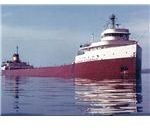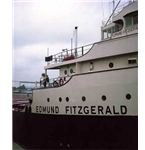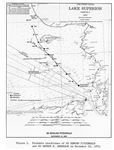The Mighty Fitz – History and Facts
The American freighter SS Edmund Fitzgerald is known by a number of names like Mighty Fitz, Big Fitz, Fitzgerald or even just Fitz. It was on November 10, 1975, that the freighter sank in Lake Superior. It was one of the worst shipping disasters that the Marine Industry had experienced in this particular region. The tragedy was immortalized by Gordon Lightfoot, who composed the song ‘The Wreck of Edmund Fitzgerald’ describing the ship and the tragedy.
In the year 1957 Great Lakes Engineering Works of Michigan was contacted by Northwestern Mutual Life Insurance Company of Wisconsin to design and build a bulk carrier for transporting taconite ore in the Great Lakes area. Taconite is iron ore of a low grade.
When the order for the freighter had been placed, Mutual Life Insurance Company had specially asked that the structure should be the largest one operating in the region. True to its commitment, a freighter 729 feet long with a capacity of 26,600 short tons was delivered. The Fitzgerald followed the traditional design and was a straightdecker cargo vessel. The 729 feet long vessel had 21 hatch openings and each opening measured 11 feet (longitudinally) by 48 feet (transversely). It was propelled by a 7500 hp steam turbine.
- Extraction is difficult, and pellets are drawn out using a process known as "oxide pelletizing." The Great Lakes has five fresh water lakes namely, Lake Superior, Lake Michigan, Lake Huron, Lake Erie and Lake Ontario. The lakes affect the weather in the region. In winters the moisture is absorbed by the winds coming from the west and as a result heavy snowfall and strong winds are experienced along the shores, and during summers the lakes keep the air cool.
-
The Last Voyage
The Mighty Fitz left for its last voyage on the afternoon of November 9, 1975. With Captain Ernest McSorley in command, it was destined for Detroit, Michigan. With over 40 years of experience under his belt, McSorley was a highly respected sailor. He took command of the freighter in the year 1972 and intended to retire after this fateful journey.
The freighter was carrying a cargo of taconite pellets that weighed around 26,116 long tons. With regards to the weather it was usual; storms were predicted and were expected to pass close south to Lake Superior by seven o’clock the next morning, that is, November 10th, the fateful day. SS Wilfred Sykes started from the opposite end two hours behind the Fitzgerald under the command of Captain Dudley, who anticipated that the storm would cross through the lake and not south of it. He decided to take a route that would help avoid the worst effects of the storm.
That night Captain McSorley had a discussion with the Captain of Anderson, another ship on the same route, and both decided to alter their route towards the north. Initially Fitzgerald followed Anderson for a few hours, but later on pulled ahead crossing Lake Superior at a speed of 14 knots. On its way it encountered rough winds exceeding a speed of 50 knots and very poor visibility.
In the afternoon, Fitzgerald radioed Anderson informing that it was experiencing a list and had already lost some railings and two vents. Later in the afternoon Anderson again received a radio message that the radar had stopped functioning. Fitzgerald slowed down and was dependent on Anderson for guidance. Early evening on the fateful day, Anderson radioed Fitzgerald and informed of a coming ship and asked how it was doing to which Captain McSorley replied, “We are holding our own.” Ten minutes later it could not be detected on the radar or made contact with on the radio.- Tragedy had struck and all 29 crew members were lost. The wreckage was not located until November 14th. A number of theories were suggested quoting reasons for the wreck of the Mighty Fitz. From breaking of the freighter into two, three sisters rouge theory, ineffective hatch closures, to a failed structure were discussed as the reason behind this tragic wreck. Weather forecast having gone wrong, inaccurate navigational charts, increased load and lack of maintenance are said to have been contributory reasons. No theory has been confirmed as explaining the cause of the wreckage.
On November 10 a memorial service was held in the Mariners’ Church at Detroit. The church bell was rung 29 times; once for each life that was lost in the tragedy. In the year 1995, ship’s bell was recovered from the wreckage and is on display in the Great Lakes Shipwreck Museum, Michigan.
23 Apr 2018
New
Remembering the Edmund Fitzgerald
About SOSTENES LEKULE JR
Hi, I`m Sostenes, Electrical Technician and PLC`S Programmer.
Everyday I`m exploring the world of Electrical to find better solution for Automation. I believe everyday can become a Electrician with the right learning materials.
MARINE HISTORY
Tags
MARINE HISTORY
Subscribe to:
Post Comments (Atom)










No comments:
Post a Comment